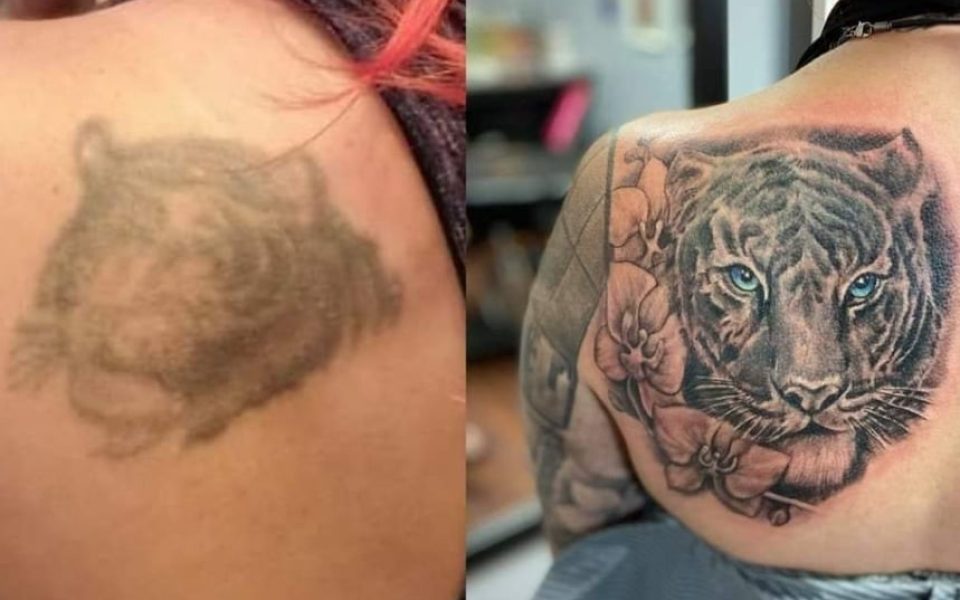Jennifer Smith’s newest tattoos take up most of her back. A white tiger with pale blue eyes sits on her left shoulder surrounded by flowers to its right. Beneath it, a red dragon roars, mouth open, its right wing just under the tiger’s chin.
In the last year and a half, Jennifer Smith’s relief from the pandemic has been tattoo therapy.
Smith, who already had more than a dozen tattoos, got her a white tiger in September 2020. It covers an older version of the same animal on her shoulder. Three months later, she got the dragon.
“I wanted my year to end how I wanted it,” she said. “I wanted to take control of something of my life.”
For the last several months, Smith has been seeing Karen Peraza, her regular tattoo artist at Tattoo Therapy, a shop in Winston-Salem where all of the artists are women. She noted that all of the staff wore masks and that they took care to clean their equipment. Soon, Smith’s 18-year-old daughter will be getting her first tattoo.
“It’s self-expression and control of me,” she said. “No one can tell me what to do. I’m taking everything in my hands. To me, tattoos are very personal, but at the same time they’re kind of freeing.”

Over the course of the pandemic, tattoo shops are one of the few businesses that have seen a boom. Tattoo artists in the US are projected to have increased by 23.2 percent by the end of 2021 according to data from IBIS World analysts. Multiple psychologists have said this is a way for many people to cope with the trauma of the pandemic.
“There was a lot of pent-up demand for tattooing, and that seems to be the trend all across the globe,” says tattoo historian CW Eldridge, who owns and operates Tattoo Archives in Winston-Salem. “Everyone I’ve talked to across continents say that’s business.”
Like other sectors, plenty of tattoo shops had to close down when the pandemic hit last March. Eldridge closed his own shop for four months, and his artists only did tattoos by appointment until three months ago. But as soon as the doors opened just a bit, Eldridge saw people making appointments in greater numbers than before.
Other local artists have seen similar trends. Beth Fairchild, a tattoo artist at Inkology in Greensboro, says people have told her that they have been able to come in because they haven’t been spending money on going out or traveling.
Fairchild mostly does tattoos for breast-cancer patients, but she says she is open to creating anything.
“I have a friend of mine who had a full alopecia response to chemotherapy and I gave her eyebrows and lashes,” said Fairchild. “That was really a life changing tattoo for her, so that in turn makes me feel really good. I have a young man who’s a paraplegic that comes in and I did a whole sleeve on his arm. He relies on other people for his basic care, so to see him smile and show it off and be super proud of it, that’s really cool. I love creating art on people, but I really love when it’s super meaningful. Those are the ones that stick with me.”
Inkology had made an effort to be as clean as possible, but Fairchild says none of her clients were very worried to begin with.
“People were coming back right away,” she says. “They had been closed up too, in their homes, and were unable to go out, so we were pretty busy when we first came back from COVID. People were happy to wear their masks and comply with all their regulations.”

Finn Skrypnyk who frequents Tried and True Tattoos in Greensboro, noted that they got two tattoos done by Lee Smith, their favorite artist, no problem. Skrypnyk explains that they met the artist as part of a local queer meet-up group.
“It was really important to go to an artist that represented and shared some of the identities that I have,” they said. “I don’t know a total count, but I have somewhere around 15 tattoos.”
One of Skrypnyk’s recent tattoos is of a heart with three daggers on their arm. They said that it was to symbolize the heartbreak that the world was going through. A year ago, they got a tattoo of Ruth Bader Ginsburg, who was a personal hero. That one took nearly five hours.
“They all represent something in my life that I was going through or commemorate a person or event,” they said. “Some of them are just fun.”
Join the First Amendment Society, a membership that goes directly to funding TCB‘s newsroom.
We believe that reporting can save the world.
The TCB First Amendment Society recognizes the vital role of a free, unfettered press with a bundling of local experiences designed to build community, and unique engagements with our newsroom that will help you understand, and shape, local journalism’s critical role in uplifting the people in our cities.
All revenue goes directly into the newsroom as reporters’ salaries and freelance commissions.


Leave a Reply